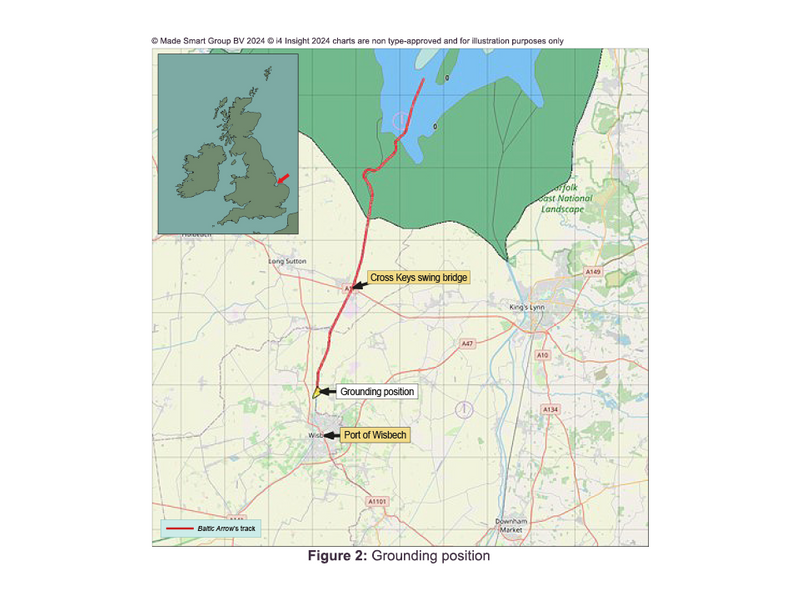Over-Correction Led to Grounding of General Cargo Vessel
The UK Marine Accident Investigation Branch (MAIB) has published its preliminary assessment of the grounding of the general cargo vessel Baltic Arrow which ran aground on June 25, 2024 near New Dyke Farm on the River Nene while enroute to Wisbech, England.
Baltic Arrow had set sail from Riga, Latvia, carrying a cargo of timber. The day before the grounding, the vessel anchored at the Wisbech anchorage off the east coast of England. At 0540 the following day, Baltic Arrow weighed anchor and proceeded to the pilot station where two pilots boarded at 0700. The master and the two pilots completed a brief master/pilot exchange before pilot A, who was under assessment by the senior pilot (pilot B), took the helm. The master and pilot B remained on the bridge but, aside from monitoring the passage, did not have specific roles within the bridge team.

At 0814, Baltic Arrow passed the Cross Keys swing bridge, and pilot A began to reduce the vessel’s speed in preparation for the berthing maneuver. At 0847, pilot A noticed that the vessel was slightly to port of the planned track. Pilot A applied 30° starboard helm and ‘kicked’ the main engine ahead to correct the vessel’s position in the narrow channel. Baltic Arrow’s bow quickly swung to starboard.
At 0848, before the bridge team could take effective avoiding action, the vessel’s bows grounded on the western bank of the river at a speed over the ground of 6 knots. Baltic Arrow’s stern was then pushed onto the eastern bank by the flood tide, wedging the vessel across the river.
There was no damage or pollution and no one was injured.
Initial attempts to free the vessel were unsuccessful, and Baltic Arrow was eventually refloated with tug assistance on the evening flood tide at 2150.
The MAIB’s preliminary assessment identified that:
Baltic Arrow probably experienced some bank effect, which pilot A attempted to counter with the starboard helm and kick ahead on the main engine. Pilot A did not realize that they had over-corrected the vessel’s heading until it was too late to avoid the grounding.
Pilot A had been helming the vessel for nearly two hours at the time of the accident. It is therefore possible that the requirement to sustain a high level of attention to complete the pilotage safely within the confined channel resulted in a lapse of concentration.
The bridge team were communicating ineffectively, and lacked a shared mental model of the task being undertaken. This meant that no one recognized the developing situation in sufficient time to prevent the grounding.
Insufficient action had been taken to prevent the reoccurrence of an incident on the River Nene following the February 2023 grounding of Baltic Arrow’s sister vessel, Baltic Express.
The Wisbech Harbour Authority has since commissioned and received an independent report into the grounding; completed a survey of the river channel; started simulator training of its pilots; started a review of vessel suitability for transits to and from the Port of Wisbech; and completed a review of the risk assessment for a grounding incident, including consideration of the benefits of requiring an escort tug.
Galleywood Shipping (Baltic Arrow) Limited has considered the introduction of an additional bridge watchkeeper and reviewed Baltic Arrow’s rudder capabilities.
